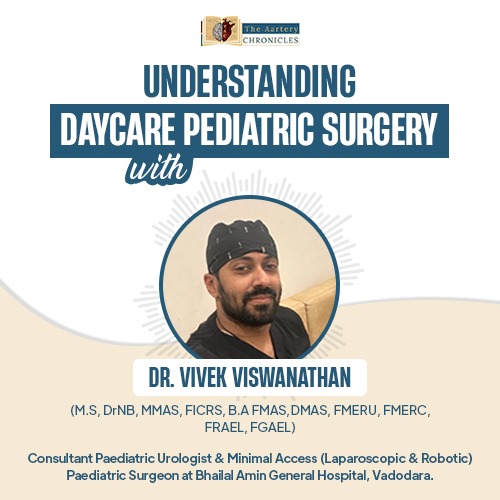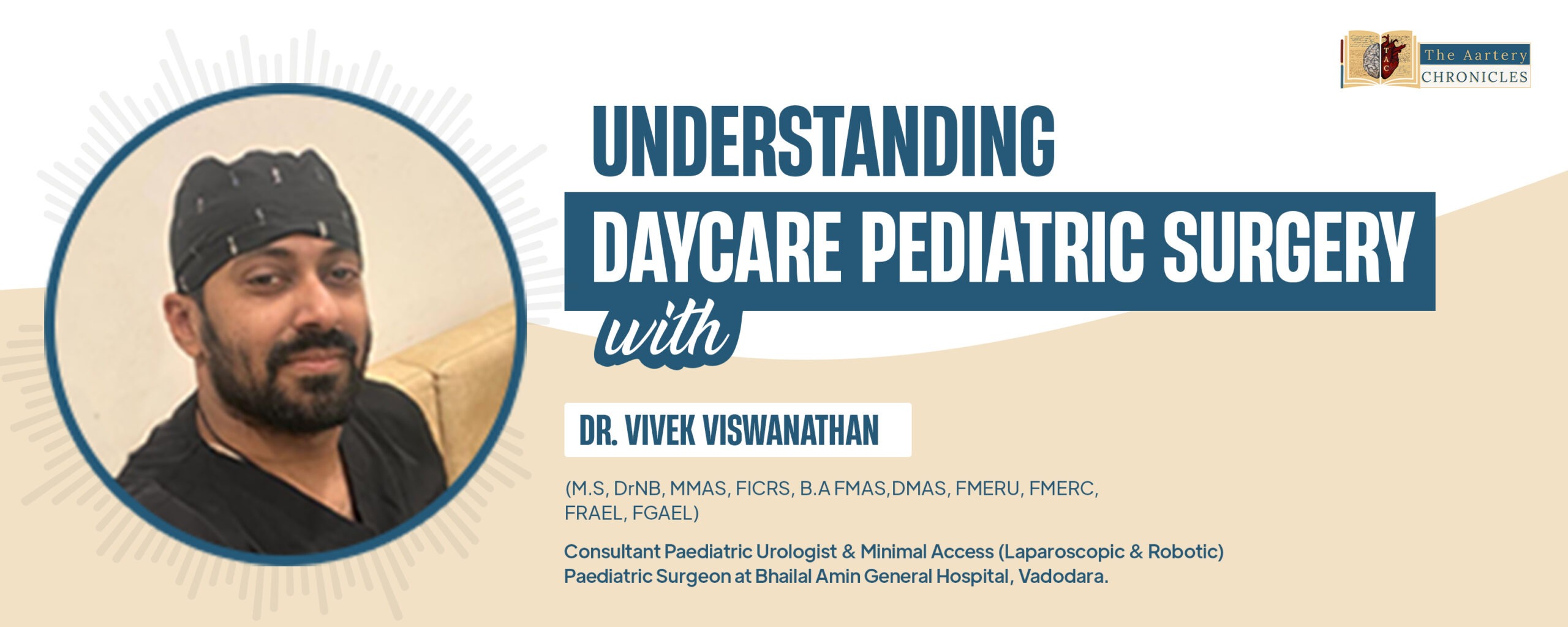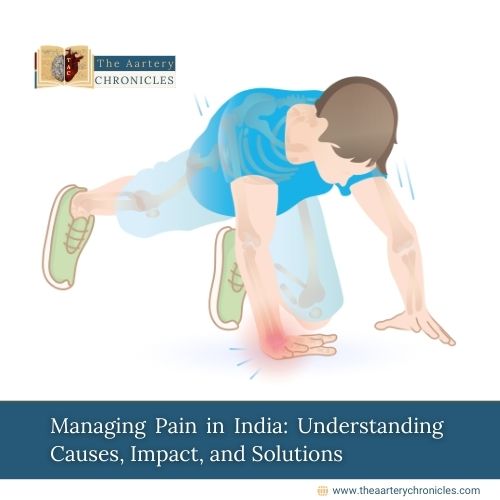

Understanding Daycare Paediatric Surgery with Dr. Vivek Vishwanathan
Overview
In a recent conversation with The Aartey Chronicles, Dr. Vivek Vishwanathan, a pediatric urologist, and minimally invasive surgeon with extensive experience in laparoscopic and robotic techniques, shared valuable insights into the practice of daycare surgeries for children.
With a background in bariatric surgery and advanced training in robotic pediatric surgery, Dr. Vishwanathan has worked extensively at the Koki Lab in Dhirubhai Ambani Hospital, Mumbai, before returning to Vadodara, Gujarat, to practice exclusively in pediatric urology.
What is Daycare Surgery and How Does It Differ from Traditional Surgery?
Dr. Vivek Vishwanathan explains that daycare surgery refers to a type of surgical procedure that is completed within a single day, allowing the patient to be discharged on the same day. This concept began in the early 1900s, particularly in 1909, and the first outpatient clinic was established in Iowa in the 1920s.
For children, who are generally in good health and often require minor surgeries, this approach is particularly beneficial. Many common pediatric conditions and procedures are suitable for daycare surgery, making it a preferred choice for quick and efficient treatment. Dr. Vivek Vishwanathan, a strong advocate of daycare surgery, highlights its numerous advantages and shares that he is actively promoting its use in his medical centre to ensure optimal care for young patients.
Common Daycare Surgeries in Pediatrics
Daycare surgeries for children are typically straightforward and can be completed within a few hours. Dr. Vivek Vishwanathan identifies circumcision as the most common daycare surgery for children.
According to Dr. Vishwanathan, some of the frequently performed daycare surgeries include:
- Circumcision: This may be performed for religious reasons or medical conditions like phimosis.
- Hydrocoele and hernia repairs: These surgeries, often required in children, are commonly done in a daycare setting.
- Undescended testes surgeries: This involves correcting the position of the testes and is manageable as a daycare procedure.
- Biopsies: Lymph node and rectal biopsies are frequently performed under daycare surgery protocols.
- Ophthalmic surgeries: Duct probing, adenoidectomy, squint repairs, and lens implantations are examples of eye-related surgeries suitable for daycare settings.
- Tongue tie release and tonsillectomy: Minor surgeries such as tongue-tie release are particularly well-suited for a daycare setting. Even tonsillectomies, which were traditionally performed with a longer hospital stay, can now be safely conducted as daycare procedures.
- Minor cyst or lump excision: Removal and biopsy of small cysts or lumps are routinely done in daycare settings.
Additionally, Dr. Vishwanathan shares that there is a growing trend towards performing more complex surgeries, which traditionally required a longer hospital stay, as daycare procedures. In such cases, children may be discharged with medical aids like catheters to continue their recovery at home. This approach is being increasingly adopted to maximize the benefits of daycare surgery.
Duration of Daycare Surgeries
Dr. Vivek Vishwanathan explains that the duration of daycare surgeries can vary significantly depending on the type of procedure. For instance:
- Circumcision: Circumcision typically takes less than 10 minutes.
- Hernia or Hydrocele Surgery: Herniotomy or hydrocoele surgery are usually completed in under 30 minutes.
- Undescended Testes Surgery: Surgery for an undescended-testes can take approximately 45 minutes.
Dr. Vishwanathan shares that generally, most daycare surgeries are completed within 10-15 minutes to an hour and a half at most.
He further elucidates that to qualify as a daycare procedure, the anesthesia used must allow for a quick recovery so that the child can be discharged the same day. Longer surgeries require prolonged anesthesia, which can delay recovery and defeat the purpose of daycare surgery. Therefore, these procedures are designed to be completed in an hour or less.
Anesthesia Considerations for Daycare Surgeries in Children
Dr. Vishwanathan notes that nearly all pediatric procedures are performed under general anesthesia, as it is generally preferred for ensuring the child’s comfort and safety. Although the anesthesia may be of a shorter duration, general anesthesia is still preferred, even for relatively minor procedures like circumcision. In some cases, it may be supplemented with a local nerve block to manage pain after the surgery. However, unless there is an absolute contraindication, general anesthesia remains the standard choice for most daycare surgeries in children.
Patient Selection Criteria for Pediatric Daycare Surgeries
Dr. Vishwanathan outlines that while most children are suitable candidates for daycare surgery due to their generally good health and minimal comorbidities, there are specific conditions that exclude some from this approach.
Contraindications for Pediatric Daycare Surgeries
According to Dr. Vishwanathan, the following conditions are typically contraindications for daycare surgery:
- Preterm Infants: Children who are extremely preterm, with a post-conceptual age of less than 50 weeks, are not appropriate candidates for daycare surgery.
- Children with major systemic or cardiac diseases: Complex cardiac conditions or significant systemic diseases increase the risk of anesthesia complications.
- Unexplained Cardiac Murmurs: Children with an undiagnosed heart murmur detected during routine assessments are excluded from daycare surgery.
- Diabetes: Although rare in children, diabetic patients are usually excluded.
- Sickle Cell Disease: Due to the potential for clotting issues, children with this condition are not suitable for daycare settings.
- Sleep Apnea: Documented breathing problems such as sleep apnea may pose risks during anesthesia.
- Active Infections: Ongoing bacterial or viral infections contraindicate not only daycare surgery but any surgery requiring general anesthesia.
Apart from these specific conditions, most other children are eligible for daycare surgery, allowing them to benefit from this efficient and less stressful treatment approach.
Pre-operative and Post-Operative Investigations for Daycare Pediatric Surgery
Pre-operative Investigations
Dr. Vivek Vishwanathan explains that for daycare pediatric surgeries, the preoperative investigations are focused on ensuring the child is fit for the procedure, and these involve:
- Complete Blood Count (CBC): CBC is done to assess overall health and identify potential bleeding risks.
- Coagulation Tests: Coagulation tests, also known as blood clotting tests, are performed to evaluate a child’s ability to stop bleeding. These tests include bleeding time, clotting time, prothrombin Time (PT), and international normalized ratio (INR).
- Serum Creatinine Test: A serum creatinine test is done to check kidney function, as anesthetic drugs are processed through the kidneys.
- Viral Markers (Triple A): A triple A viral marker test is done to screen for any infectious markers.
Additional tests, such as X-rays or sonography, are only ordered if specific conditions or concerns arise, such as confirming a hernia.
Post-operative Investigations
Typically, routine postoperative investigations are not required for daycare surgeries. Follow-up is generally done after a week to monitor recovery. However, if a specific issue is detected during follow-up, such as an undescended testis, further investigations like sonography may be considered, though these are not standard practice.
Recovery and Follow-Up for Daycare Surgeries
Dr. Vishwanathan explains that the recovery process for daycare surgeries is generally swift and straightforward. By definition, daycare surgery indicates that the child should be able to resume normal activities, such as returning to school, as soon as the next day. However, due to the potential for accidents in a school environment, he recommends that children avoid school for about a week to prevent any unintentional injury to the surgical site.
Parents are advised that while the child can return to regular activities the day after surgery, they should take precautions to avoid situations that could cause injury. The surgical site typically involves absorbable stitches and wash-proof dressings, so bathing and showering are not problematic. Additionally, the pain is usually well managed, and there is no need for stitch removal or extensive aftercare.
Post-operative Precautions and Complications for Daycare Surgeries
Post-operative Precautions
Dr. Vishwanathan notes that while there are no strict restrictions after daycare surgery, some general precautions are advisable. For instance, if the surgery involved an undescended testis, children should avoid activities like cycling for a week to prevent discomfort. Additionally, lifting heavy weights and engaging in activities that might cause injury to the surgical site should be avoided. These precautions help in ensuring a smooth recovery and minimizing the risk of complications.
Potential Complications
Regarding post-recovery complications, Dr. Vishwanathan indicates that while complications are possible, they are generally rare due to the relatively straightforward nature of daycare procedures. Common complications include pain, bleeding, and infection. Pain and bleeding are typically noticeable immediately, while infections might become apparent during follow-up visits. In his experience, there have been instances where bleeding occurred, or recovery from anesthesia took longer, occasionally resulting in an overnight hospital stay instead of the planned daycare discharge. Despite these occurrences, such complications are uncommon and generally manageable.
Conclusion
In conclusion, daycare pediatric surgeries provide an efficient approach that benefits many children by minimizing hospital stays and promoting quicker recoveries. These procedures are designed for efficiency, allowing children to return to their normal activities soon after surgery. While the recovery process typically involves minimal restrictions and is generally straightforward, careful consideration is required for each case to ensure the child’s well-being.









